By the time I got around to having my own kid, I’d spent over three decades imagining and actualizing myself as a writer, an activist, a queer feminist, but never as a “mom.” As queer people do, once Waffle and I decided we were going to have a baby, I spent two full years overprocessing everything I could imagine or predict about joining the mommy cult before I even got knocked up.
I kept processing it all during the pregnancy as a queer feminist pregnant hard femme. I documented a lot of that here, on Autostraddle, with all of you. Still, I wasn’t at all prepared for first time parenting. No one is. Some things you just can’t prepare for. The hardcore sleep deprivation, the zero-sum-game of trying to maintain a sense of dignity postpartum, the ritualistic hazing that is trying to force an overtired baby to take a nap, the constant feeding-changing-sleeping-crying routine.
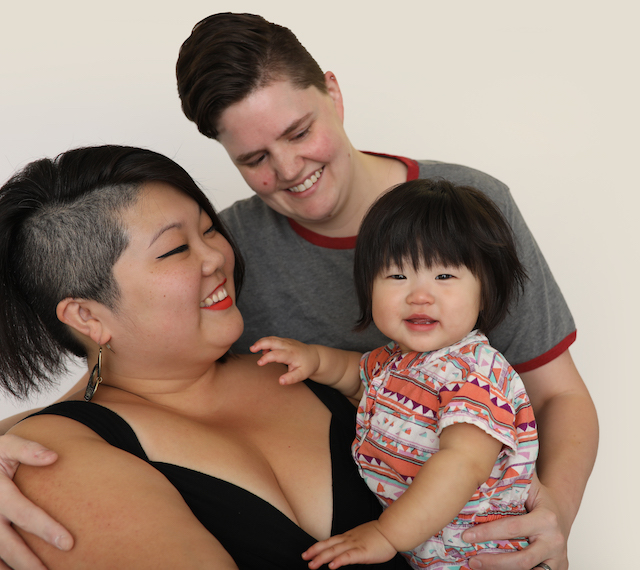
Literally just humble-bragging about how cute we are. Like, we’re really cute. (via our first birthday shoot with Jessica Stringer Photography)
What I wasn’t even remotely prepared for was how parenting would affect me as an adoptee.
I spent some time processing pregnancy as an adoptee, but I didn’t anticipate the feelings I’d have about being adopted and raising a toddler who still isn’t as old as I was when I came to the United States on an airplane. I thought I’d banished those ghosts a long time ago, the questions that I used to ask my mom over breakfast when I was little: “Where am I from?” “Why did they give me up?”
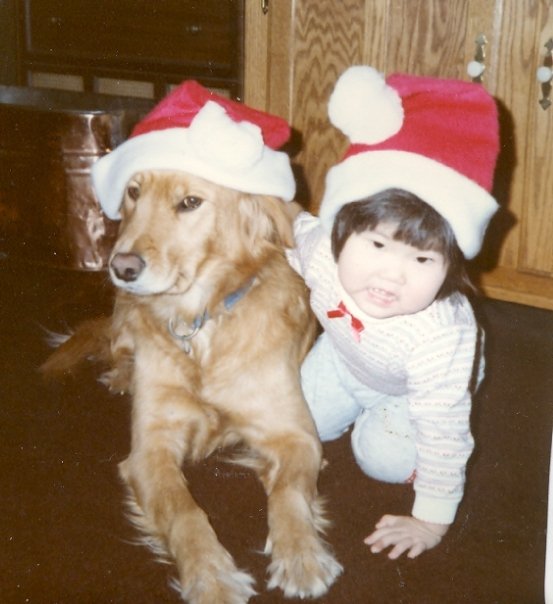
Me annoying one of our family dogs, Molson (named after the Canadian beer, yes, my parents were cool)
Recently, my 16-month-old baby has started to call for me by name in the morning: “Ma! Ma!” I always get up with her, something I resented in those early months but cherish now that we’re both sleeping through the night. (Parenting, like most things in a relationship, is so much playing to each others’ strengths. Waffle is a grouchy bear in the early morning. I can survive on less sleep and I was breastfeeding for the first six months, so I do my part on the wake-up shift. Waffle does his part in many other ways, like doing all the meal planning and grocery shopping.) Remi wakes up every morning knowing I’ll be there because I’ve been there every morning for the past 16 months, almost every single day of her life.
When I was a little over 17-months-old, I was delivered off a plane and placed into my parents’ arms and into my whole existence. Everything before that moment is gone, is vapor, a few translated sentences in my adoption papers. The loss of my history has never struck me the way it does now that I have a baby. I guess I’d always thought of babies as little, nonsensical, silly things. I didn’t know the difference between a one-week-old and a one-year-old until I carried my baby through that first year, from learning to latch to fighting over eating her vegetables.
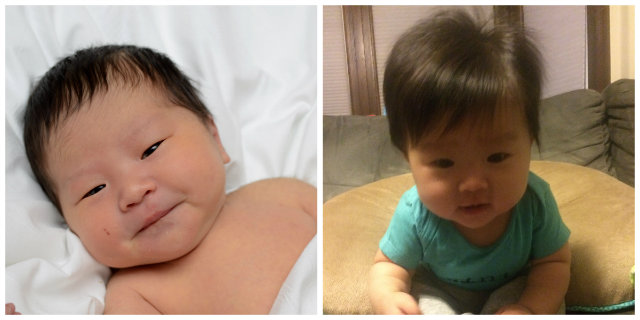
Remi as a newborn (left) and at 6 months old, learning to sit up (right).
I didn’t comprehend that Little KaeLyn or, rather, Little Eun Jeong, had a whole 17 months of development and language and culture and food and exploration and family in another country halfway around the globe. Who I am was split in two at the moment I got on that plane to meet my new family. It might as well be a different person in a different world who lived my life before I came to the U.S. When I imagine it, it’s like imagining a foreign movie with subtitles or the plot of a book about Korean children, written by a visiting Western author. I will never get it back; even if I go to Korea now, as an adult, I’ll be a visitor. I can never go home to Korea, but Korea was my home. For 17 months, I was someone else. Home was somewhere else.
At 16 months, Remi knows the sound a cow makes (“Muh!”). She can bring me a book or a stuffed animal on request. She signs “more” fervently when she’s hungry and she loves cats (“Kah-Tah” as she says). She’s started sorting objects by type and loves to stomp her feet to music. She expects applause when she puts a ball through her Fisher Price basketball hoop. At 16 months, she knows a dozen baby words and understands more than that. Her favorite movie is Moana and she giggles or shrieks at her favorite parts. When she hears one of us in the bathroom, she runs in and drags her stool up to the bathroom sink to wash her hands. Right now, she’s double-fisting saucy strands of spaghetti and emphatically grunting, “Mmmmm,” between bites. At 16 months, she shows her love for us when she runs to meet Waffle at the door with a “Da! Da!” or when she grabs my neck in a big hug and gives firm, little pats on my arm (pat-pat-pat).
At 16 months, I knew…
At 16 months, I played with…
At 16 months, I said…
At 16 months, I loved…
At 16 months, I woke up and asked for…
Who Remi is, is so clear already. She’s cunning and likes to play little tricks on us. She’s a fearless adventurer who takes calculated risks and hard falls and gets up ready to try again. She is already insistently independent and wants to do everything herself. She’s a fast learner and a fast runner. She’s truly extra in every way and I love that about her.
My mom says we’re “exactly the same.” As she gets older, I definitely agree. Our pictures are almost identical to the untrained eye. But I wonder what I was like before my mom knew me. I wonder what words I said that no one in my American family could understand. I wonder how I interpreted getting on a plane in one world and popping out in another one, a new place where I couldn’t understand a single word and where no one could understand me. Surely, I was talking. Remi talks all day. Where did I think my biological parents went? How did I process moving to a home where nothing was familiar and where no one looked like me?
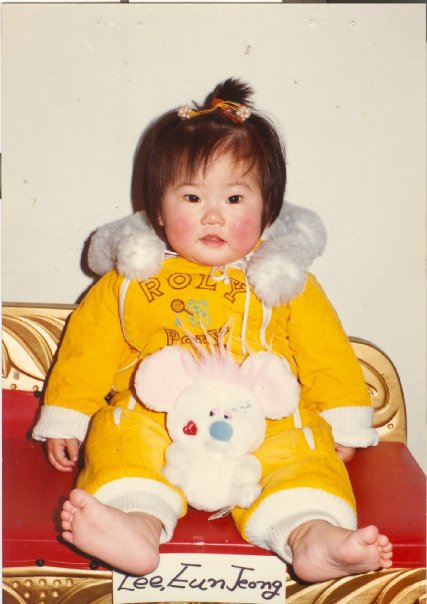
My adoption photo and my first picture of myself.
My mom and dad say I adapted quickly to my life in the U.S. and wasn’t afraid at all. I went right to them or to any stranger. I didn’t cry. I was a happy baby. I see that tenacity in Remi. She fears nothing. She adjusts quickly when traveling or going to the babysitter’s house or spending the night at Gramma and Grandpa’s house. She never seems to worry that we aren’t coming back. She’s so sure of herself.
Was I ever “just like” someone else? Are personality traits hereditary or chance? It’s hard to say, but I like to think that I’m getting a peek into who I might have been by knowing who Remi is. Her life story will be different than mine, a little more filled out, but it will still have gaps. Gaps in my history, that I can’t pass down to her. Gaps in the donor’s history (though we actually know way more about the donor’s biological family than we do about mine). And gaps where the complexity of being a Korean person in a mostly white family become painfully clear.
I went into parenting ready to reclaim “mommy” and ready to queer momminess. I didn’t expect to reclaim my need to explore my lost ancestry or my identity as Korean-American. I didn’t know that it would open something I thought I’d sealed up inside me a long time ago, the whispers of ancestors I can’t quite hear.
For now, I see parts of myself in my baby and it makes me feel simultaneously a little more empty and a little more whole. When I think about Remi growing up, I think about learning about Korean culture together, learning to cook Korean food for her, and ultimately about going back to Korea together. I just recently let myself say out loud that I’d like to do a birth family search, though I know how improbable is it that I’ll find anything. Anyone.
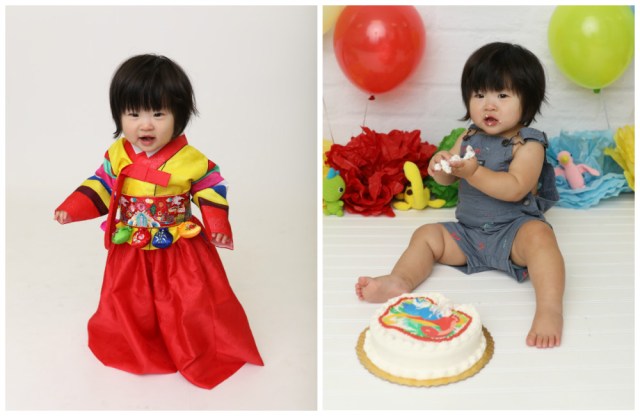
Remi’s dol-bok (Korean traditional 1st birthday garment) and cake smash, Korean and American first birthday traditions captured by Jessica Stringer Photography
In a couple weeks, she’ll be the same age I was when my plane touched down at JFK airport. I’ll finally be able to put pictures of her and me side-by-side to compare.
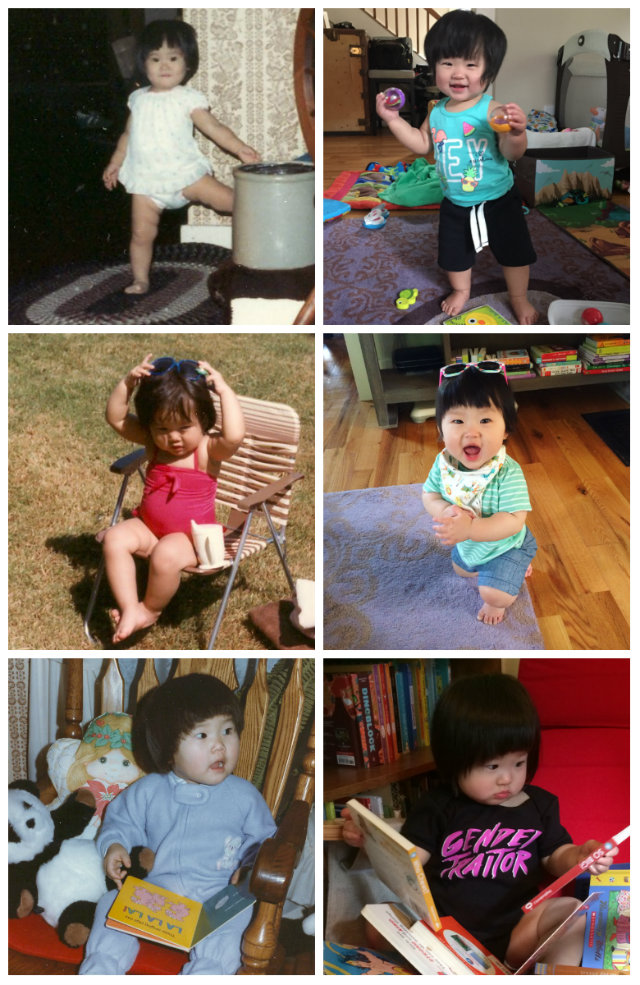
Me (left column), first year in the U.S. ages 17 months to 24 months. Remi (right column), first year of life ages 9 months to 12 months.



KaeLyn, I cannot tell you how happy I am that this was the first thing I read this morning!
Your essay was reflective, thoughtful, vulnerable, and oh so loving. Thank you for sharing these bits of Remi (and these bits of yourself) with us. I’ll definitely be carrying your story in my heart today.
Also, I don’t know how you pulled that gif off, but I keep watching it. I’m mesmerized.
REMIIIIIIIII
Correct. That is Remi, yes.
This made me laugh! Thank you!
KaeLyn, this is beautiful. Thank you for sharing.
Thank you! <3
<3
This was such a great, thoughtful, interesting read! Thank you for sharing. Also: REMMMMMIIIIIIIII <3
Thanks for reading, @queergirl! <3
Thank you for this, KaeLyn! Your kid is ADORABLE and your family is THE CUTEST I’VE EVER SEEN. This also feels so topical in my life as I’m doing some really hard thinking about transracial adoption and the work I have to do before I could possibly think about adopting a child that isn’t white.
Thanks, @mdhp! We are pretty cute. Remi, mostly. She makes us all cuter as a family.
FTR, I don’t advocate against transracial adoption. Some adoptees do, but I had an overall good and positive experience as an adoptee. Being aware of race and understanding that there will be things you can’t understand is important and reading first-person stories of transracial adoptee experiences and making an active plan to dismantle white supremacy in your parenting choices… It’s valuable that you’re thinking about it now!
Baby T-rex’s hair is KILLING IT!
Remi’s hair is ridiculous! She’s had, like, 6 haircuts already!
Oh my god, this is so cute! ^^
KaeLyn I’ve been so impressed and so grateful with how generously you’ve shared your experiences with pregnancy and parenting here. This essay is so difficult and tender and beautiful, thank you so much
Thank you! <3
This was such a wonderful piece, thank you. As someone who has never been ambivalent about wanting to be a mother, but who is struggling through fertility treatments as a lesbian, I’m desperate for queer parenting, pregnancy, and conception stories. This brings up a lot of thoughts regarding our current situation (trying to conceive, not very successfully, with IUI and donor sperm) as well as other paths to parenthood we want to explore, such as adoption.
Fertility treatments can be hard! We tried for 2 years without it working, and now we’ve been foster parenting for a year. It definitely has it’s struggles, but I always saw myself as growing up to be a parent. I don’t know if it’s a good fit for my wife, however, which is tricky.
TTC is so emotionally draining. I hope you’re taking care of yourselves through it and that you find a path to parenthood that works for you!
If you haven’t already read it, we did this roundtable about different paths to queer parenthood in 2015: Gayby Maybe? The Epic Queer Parenting Roundtable!
How intense it is to realize just how much we’ve acquired in the first few months of our lives, how much awareness we have already. And how adaptable we are to change ! Maybe you were particularly open to new people and experiences, nevertheless it is quite a trip to think about that.
I keep coming back to the word Intense, that’s how your journey strikes me.
And those baby and family photos ! So cute, _intensely_ cute !
Intense is a great word to describe Remi and, apparently, me. Haha!
It’s remarkable, really, that I adjusted so well. I can’t imagine taking Remi and putting her in another country and her just living life as though we never existed. It hurt to imagine it.
Oh gawd that gives me shivers…
HERE FOR ALL THE REMI CONTENT
also this was the first thing i read when i woke up this morning and i teared up a little and also just love it all
Thanks, boss! <3
Such a lovely, thoughtful, thought provoking article. And that photo of the 3 of you is just gorgeous.
Thanks, @cepperly! Our photographer was a magic-maker!
this is so so wonderful and I’m crossing my fingers that raising baby t-rex is a new series!!!
Not officially, @bluefaiu, but not not a possibility?
Loving this. Thank you for writing it!
This is lovely. Thank you. What does Remi’s future hold? Did she pick the money, pencil, thread, or food?
Thanks for asking, @gray-hairedgrad! We did a slightly non-traditional doljabi and added some other items to the traditional ones. She picked a ball, representing athleticism. The donor was into lots of sports and she’s a wrecking ball, so it seems accurate so far!
This was a great article, thanks for the read and sharing your story with us! On a side note, one of my 1 year old twins is still not sleeping through the night, waking twice a night to eat… sigh. Soon, I hope.
Also, Remi is ADORABLE.
Oh, @ruthabelle! I feel ya’! We were still waking up once/night until about 13 months. (WAH) It’s rough. There’s an end in sight, I swear! Sending love and coffee!
I’ma be honest: this post could’ve contained no words whatsoever and it still would’ve been my favorite thing today because of those pics of Baby Remi and Baby KaeLyn. So, so adorable…
But, onto the actual substance of it all…this essay really blew me away, @kaelynrich…not just for the beautiful prose and vulnerable reflection…but also because this is part of my story too and I’d never even really thought about it until just now. My story’s different, of course–I’m not adopted–but I was born to a German woman and an American service man and I suspect my first words must have been German (we didn’t live on base) and that I must’ve had a pretty healthy German vocabulary when my dad brought us to the States. My mind is blown just thinking about it.
I can’t wait to sit down and ask my mom about it soon. Thanks for provoking the conversation, Kaelyn.
It’ll be interesting to hear what you find out!
Much adorbs! You three ARE mega cute.
This was beautifully written, and thank you for sharing an essay as personal as this one. It also has me thinking(again) what my life would be if I was in my parents home country and they didn’t have to leave due to political turmoil.
Side note I think I read somewhere that personality traits can be both hereditary & chance.
Yes, I think I’ve heard that, too, @needlesandpin, that personality traits can be affected by DNA and learned. Both-and, I guess.
It’s weird to imagine a life in another country that was disrupted for any reason. I can definitely relate to that feeling of being lost in place.
KaeLyn, I always love your writing! You are so great at unpacking really complex feelings and thoughts in an accessible way. This piece was especially good given the ADORABLE baby photos. Thanks for starting my Wednesday the right way.
Thanks, @gem-2! I’m really glad you enjoyed it and cute baby pics never hurt either, right? <3
You write so beautifully, thank you for being generous enough to share something so personal.
Also, Remi’s dol-bok <3
The dol-bok was the cutest! There was a jobawi (hat) that went with it, but we couldn’t get her to keep it on.
This is beautiful. Thank you.
Thank you for having the courage to be vulnerable and to share that with all of us. It is truly a gift. I think you should go ahead and try to search for your birth family, don’t let numbers and statistics keep you from going for it. You might be surprised by that you find! It might be a fun thing to get Remi involved with once she gets a bit older.
Thanks! It’s more about time and resources that keeps me from doing a search, but I think I’ll definitely take some steps in that direction!
Thank you for sharing!
<3 Hope you and your fam are well!
BABY T-REX!!!! I cannot believe it’s been 16 months already! ?
Thank you for sharing. I know it’s not on the same level, but I def ask myself how a fourth generation hapa can pass on a sense of heritage to my own babies, how to foster that connection with culture when my own feels so tenuous. It feels good to see someone grappling with related feelings and just doing the thing. The doljabi picture was amazing ?
Honestly, it’s not not on the same level. I’ve found my adoptee experience w/ racial and ethnic identities is very similar to other people who are 2nd or 3rd or 4th generation and/or who are mixed race. It’s a different, but similarly complicated relationship. I’m learning as I go, somewhat imperfectly. It’s certainly hard to learn “how to be Korean” without any Korean role models in my life, much less to honor those cultural experiences for Remi.
Thank you so much for sharing this, it was such a beautiful read
This is so much and so good <3
AUDREY! I miss you!!!
Late to the party but this is such a touching and powerful piece. Your family is the cutest!
Thank you, @yestodaysatan! <3
I loved this, thank you for sharing.
Thank yoooouuu! Hope your family is well!